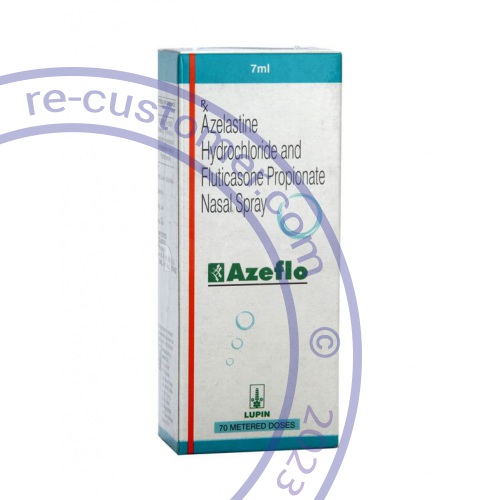- Trusted Tablets
- Antialérgico
- Dymista

Marca(s): Azeflo
Fabricante: Lupin
Diseases: Allergy
| Empaquetado | Precio | Per espray | Ahorro | Order |
|---|---|---|---|---|
| 140mcg/50mcg × 4 Sprays | € 113.73 | € 28.43 | € 28.40 | Añadir a la cesta |
| 140mcg/50mcg × 2 Sprays | € 71.07 | € 35.53 | Añadir a la cesta |
Dymista nasal spray
What is Dymista?
Dymista nasal spray contains a combination of azelastine and fluticasone. Azelastine is an antihistamine that reduces the effects of natural chemical histamine in the body. Histamine can produce symptoms of sneezing, itching, watery eyes, and runny nose.
Fluticasone is a steroid that prevents the release of substances in the body that cause inflammation.
Dymista nasal spray is used to treat nasal symptoms such as congestion, sneezing, and runny nose caused by seasonal allergies.
Dymista nasal spray is for use in adults and children who are at least 6 years old.
Important Information
You should not use Dymista if you are allergic to azelastine (Astelin, Astepro, Optivar) or fluticasone (Advair, Cutivate, Flovent, Flonase, Veramyst), or if you are also taking ritonavir (Norvir, Kaletra).
Before using Dymista, tell your doctor if you have glaucoma or cataracts, diabetes, herpes simplex virus of your eyes, tuberculosis or any other infection, sores or ulcers inside your nose, or if you have recently had injury of or surgery on your nose.
It may take up to several days of using Dymista nasal spray before your symptoms improve. Tell your doctor if your symptoms do not improve after a week of treatment.
Fluticasone can lower blood cells that help your body fight infections. Avoid being near people who are sick or have infections. Call your doctor for preventive treatment if you are exposed to chicken pox or measles. These conditions can be serious or even fatal in people who are using steroid medication.
Do not share Dymista with other people, even if they have the same symptoms you have. Do not give this medicine to a child younger than 12 years old without medical advice. Steroid medication can affect growth in children. Talk with your doctor if you think your child is not growing at a normal rate while using this medication.
Before taking this medicine
To make sure Dymista is safe for you, tell your doctor if you have ever had:
- sores or ulcers inside your nose;
- an injury of or surgery on your nose;
- chickenpox or measles;
- tuberculosis or any other infection or illness;
- herpes infection of your eyes; or
- glaucoma or cataracts.
It is not known whether Dymista will harm an unborn baby. Tell your doctor if you are pregnant or plan to become pregnant.
Using azelastine and fluticasone nasal while you are breast-feeding may cause your breast milk to taste bitter. If you breast-feed while using this medicine, watch for signs that your baby is not nursing as well. Talk to your doctor about the best way to feed your baby.
How should I use Dymista?
Use Dymista exactly as prescribed by your doctor. Follow all directions on your prescription label and read all medication guides or instruction sheets.
Read and carefully follow any Instructions for Use provided with your medicine. Ask your doctor or pharmacist if you do not understand these instructions.
Shake the medicine bottle gently just before each use.
Avoid getting Dymista in your eyes or mouth.
If the medicine gets in your eyes, rinse with water for 10 minutes and then call your doctor.
Do not allow a young child to use this medicine without help from an adult.
Store Dymista nasal spray in an upright position at room temperature. Do not freeze or refrigerate.
Throw away the medicine after you have used 120 sprays, even if there is still medicine left in the bottle.
Dymista dosing information
Usual Adult Dose for Allergic Rhinitis:
1 spray in each nostril twice a day
Uses: Relief of symptoms of seasonal allergic rhinitis
Usual Pediatric Dose for Allergic Rhinitis:
6 years and older:
1 spray in each nostril twice a day.
What happens if I miss a dose?
Use the medicine as soon as you can, but skip the missed dose if it is almost time for your next dose. Do not use two doses at one time.
What happens if I overdose?
An overdose of Dymista is not expected to be dangerous. Seek emergency medical attention or call the Poison Help line at 1-800-222-1222 if anyone has accidentally swallowed the medication.
Using too much of this medicine long term can lead to thinning skin, easy bruising, changes in body fat (especially in your face, neck, back, and waist), increased acne or facial hair, menstrual problems, impotence, or loss of interest in sex.
What should I avoid while using Dymista?
Avoid driving or hazardous activity until you know how this medicine will affect you. Your reactions could be impaired.
Drinking alcohol with this medicine can increase certain side effects.
Avoid being near people who are sick or have infections. Call your doctor for preventive treatment if you are exposed to chickenpox or measles. These conditions can be serious or even fatal in people who are using Dymista.
Dymista side effects
Get emergency medical help if you have signs of an allergic reaction to Dymista: hives; difficult breathing; swelling of your face, lips, tongue, or throat.
Stop using the medicine and call your doctor at once if you have:
- severe drowsiness;
- severe or ongoing nosebleeds;
- noisy breathing, runny nose, or crusting around your nostrils;
- redness, sores, or white patches in your mouth or throat;
- fever, chills, tiredness, body aches;
- blurred vision, tunnel vision, eye pain, or seeing halos around lights;
- any wound that will not heal; or
- signs of low adrenal gland hormones - worsening tiredness or weakness, feeling light-headed, nausea, vomiting.
Steroid medicine can affect growth in children. Tell your doctor if your child is not growing at a normal rate while using this medicine.
Common Dymista side effects may include:
- headache;
- nosebleeds; or
- altered sense of taste.
This is not a complete list of side effects and others may occur. Call your doctor for medical advice about side effects. You may report side effects to FDA at 1-800-FDA-1088.
What other drugs will affect Dymista?
Using Dymista with other drugs that make you drowsy can worsen this effect. Ask your doctor before using opioid medication, a sleeping pill, a muscle relaxer, or medicine for anxiety or seizures.
Tell your doctor about all your other medicines, especially:
- ritonavir (Norvir, Kaletra); or
- antifungal medicine - fluconazole, itraconazole, ketoconazole.
This list is not complete. Other drugs may interact with azelastine and fluticasone, including prescription and over-the-counter medicines, vitamins, and herbal products. Not all possible drug interactions are listed here.
Further information
Remember, keep this and all other medicines out of the reach of children, never share your medicines with others, and use Dymista only for the indication prescribed.
Always consult your healthcare provider to ensure the information displayed on this page applies to your personal circumstances.

Cómo puedo ayudarle?



